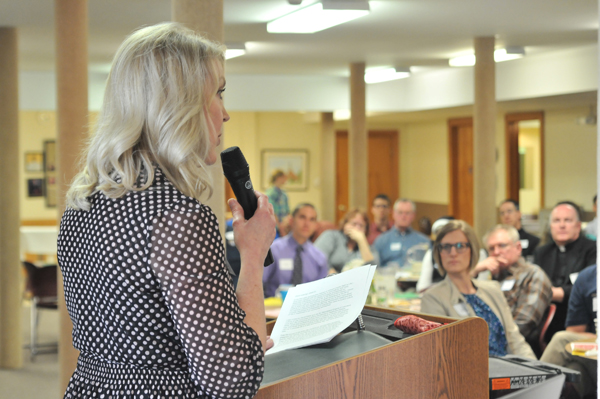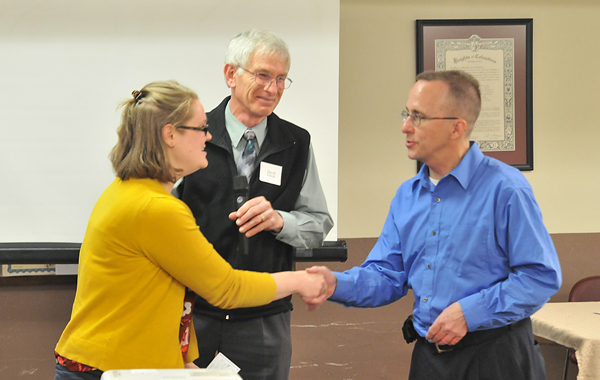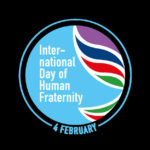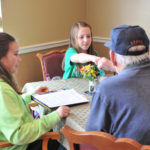By Lindsay Steele
The Catholic Messenger
IOWA CITY — Three women shared their stories at the annual Culture of Life Dinner, each with a different reason for being passionate about natural family planning and its role in women’s health care.

Sheryl Schwager, executive director of Johnson County Right to Life, speaks at the Culture of Life Dinner April 28 at St. Wenceslaus Catholic Church in Iowa City.
They expressed gratitude during the April 28 event at St. Wenceslaus Parish for the opportunity to learn about the Creighton Model FertilityCare System of natural fertility care and family planning methods at Pope Paul VI Institute in Omaha. Each woman received assistance through St. Wenceslaus Knights of Columbus’ Pope Paul VI Institute grants. The Culture of Life Dinner serves as the primary fundraising event for the grant program. Traditionally, these grants have been awarded to people interested in becoming  practitioners or medical consultants.
practitioners or medical consultants.
Sheryl Schwager, executive director of Johnson County Right to Life and a member of St. Patrick Parish in Iowa City, received a new grant intended for people in the Diocese of Davenport who desire to become Pope Paul VI Institute ambassadors. The grant provides funds to attend the Women’s HealthCare Matters conference at the institute.
“Ambassadors spread the word about the Creighton Model FertilityCare System and the available tuition grants,” said David Fetzer, who chairs the scholarship program. “Those apprehensive about submitting a medical or practitioner application may find it beneficial to attend the Women’s Matters conference to help discern if they should take this next step.”
Schwager attended the conference in October. Speakers and participants delved into Humanae Vitae (Theology of the Body), the encyclical in which Pope Paul VI affirmed the church’s teaching on sanctity of human and married life. The Catholic Church does not approve of artificial forms of birth control for family planning. Participants learned about how the Creighton system helps women better understand their body’s natural fertility, achieve or avoid pregnancy and find solutions to a variety of health problems.
At the time, she didn’t feel called to become a practitioner. “But I thought to myself, I’ll keep this in prayer and see what God has to say.” Later, she contemplated the impact she could have on the community as a practitioner. “I could help couples embrace the gift of their fertility and mirror the image of the Holy Trinity in their marriages. I also began to see how the mission of Johnson County Right to Life could be enhanced to raise awareness and provide education about this revolutionary healthcare to women of all ages, medical professionals, clergy and the community.” Schwager may apply for St. Wenceslaus KC grant assistance upon her acceptance into the program.
Practitioner intern and grant recipient Brandi Downy spoke next. She began experiencing painful menstrual cycles during her teenage years. When she met her future husband, Phil, she began to wonder if her symptoms indicated fertility issues. She went to a women’s clinic, but left “pretty disappointed. They didn’t try to help. They just offered me the birth control pill and sent me on my way.”
During marriage prep, Brandi and Phil were required to learn a Natural Family Planning method. Phil’s sister told them to check into the Creighton model “because it had a medical component.” Through working with a practitioner and sending charts to a FertilityCare physician, Brandi received treatment for her condition and, later, conceived her son Samuel.
She decided to become a practitioner as a way to raise awareness and bring hope to women and couples who feel disheartened. “God had put such a passion in my heart for this subject. … I feel like it really does make a difference.”
Amanda Blohn of Cedar Falls, Iowa, suffered from migraines for years. Traditional methods didn’t dull the pain and nausea. Once doctors pinpointed the migraines as being hormonal in nature, they suggested the birth control pill — something she wasn’t comfortable taking. The mother of three was able to find solutions through the FertilityCare system. “I was finally migraine free.”
She decided to discern becoming a practitioner at the suggestion of her practitioner, Jamie Rathjen, a past grant recipient, who encouraged Blohn to pray about it. Through discernment, she knew that becoming a practitioner “was what I needed to do,” Blohn said. She is grateful for the grant she received and is currently a practitioner intern.
The dinner’s keynote speaker, Sister Renee Mirkes, OSF, directs the ethics division of Pope Paul VI institute. She gave her perspective on societal risks associated with widespread artificial birth control use and how the institute helps “reverse society’s contraceptive mentality.” She is proud of the 40 years of research that has gone into creating a family planning and women’s health model that “cooperates with rather than suppresses” fertility. The institute’s mission, she said, is “all about reconnecting life and love in the context of the marital union.”
Fetzer said donations at the dinner totaled $4,275, and were matched by an anonymous donor. Dr. Stephen Pallone, the grant program’s inaugural recipient, and his wife, Melinda, donated $2,500. Sr. Mirkes thanked all donors of the St. Wenceslaus KC’s grant program. “You may never see the ripple effects, but they are there, they are real and they are everywhere changing people for the better.”
For more information about the grants, go to http://stwenc-ic.com/kofc/fertility-care-grant.











